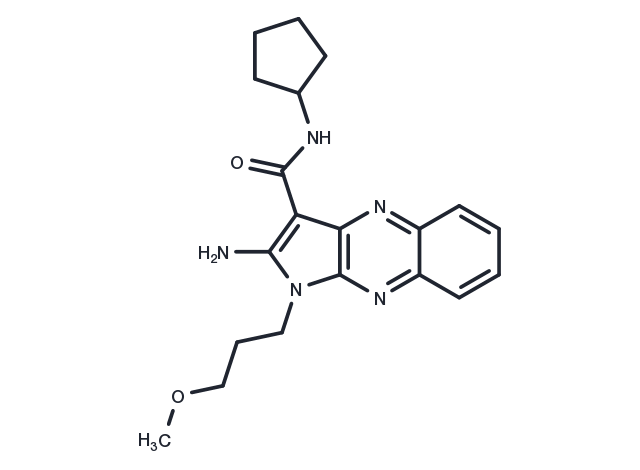Powder: -20°C for 3 years | In solvent: -80°C for 1 year


Sirtuins (SIRTs) represent a distinct class of trichostatin A-insensitive lysyl-deacetylases (class III HDACs). Human SIRT1 is the homolog of yeast silent information regulator 2 (Sir2) and has been shown to regulate the activity of the p53 tumor suppressor and inhibit apoptosis. Small molecule activators of SIRT1, such as resveratrol, extend lifespan in yeast and C. elegans in a manner that resembles caloric restriction. CAY10591 has been identified as an activator of the enzyme SIRT1. This compound increases fluorescence by 233% in a SIRT1 activity assay. [Activator activity was defined as the percentage of signal increase relative to signal window in the following formula: 100 x (Sample - Signallow)/(Signalhigh - Signallow)]. CAY10591 suppresses TNF-α in a dose-dependent manner. In THP-1 cells, TNF-α levels decreased from 325 pg/ml (control) to 104 and 53 pg/ml with 20 and 60 µM CAY10591, respectively. This activator also has a significant dose-dependent effect on fat mobilization in differentiated adipocytes, which would indicate the potential of SIRT1 activators for anti-obesity or anti-diabetic purposes.

| Pack Size | Availability | Price/USD | Quantity |
|---|---|---|---|
| 1 mg | 35 days | $ 160.00 | |
| 5 mg | 35 days | $ 686.00 | |
| 10 mg | 35 days | $ 1,240.00 | |
| 25 mg | 35 days | $ 2,710.00 |
| Description | Sirtuins (SIRTs) represent a distinct class of trichostatin A-insensitive lysyl-deacetylases (class III HDACs). Human SIRT1 is the homolog of yeast silent information regulator 2 (Sir2) and has been shown to regulate the activity of the p53 tumor suppressor and inhibit apoptosis. Small molecule activators of SIRT1, such as resveratrol, extend lifespan in yeast and C. elegans in a manner that resembles caloric restriction. CAY10591 has been identified as an activator of the enzyme SIRT1. This compound increases fluorescence by 233% in a SIRT1 activity assay. [Activator activity was defined as the percentage of signal increase relative to signal window in the following formula: 100 x (Sample - Signallow)/(Signalhigh - Signallow)]. CAY10591 suppresses TNF-α in a dose-dependent manner. In THP-1 cells, TNF-α levels decreased from 325 pg/ml (control) to 104 and 53 pg/ml with 20 and 60 µM CAY10591, respectively. This activator also has a significant dose-dependent effect on fat mobilization in differentiated adipocytes, which would indicate the potential of SIRT1 activators for anti-obesity or anti-diabetic purposes. |
| Synonyms | CAY10591 |
| Molecular Weight | 367.44 |
| Formula | C20H25N5O2 |
| CAS No. | 839699-72-8 |
Powder: -20°C for 3 years | In solvent: -80°C for 1 year
DMSO: 20 mg/mL
DMF:PBS (pH 7.2) (1:1): 0.5 mg/mL
DMF: 30 mg/mL
Ethanol: 1 mg/mL
You can also refer to dose conversion for different animals. More
bottom
Please see Inhibitor Handling Instructions for more frequently ask questions. Topics include: how to prepare stock solutions, how to store products, and cautions on cell-based assays & animal experiments, etc.
CAY10591 839699-72-8 CAY 10591 CAY-10591 inhibitor inhibit
